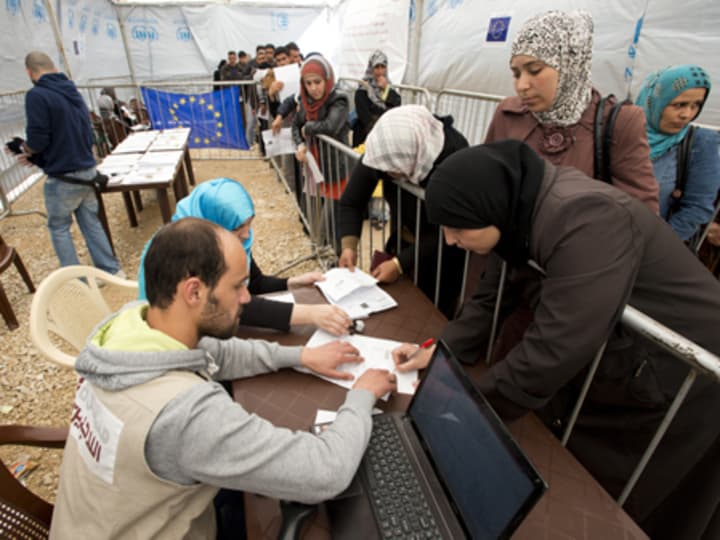
Food vouchers in Lebanon are set to go electronic in September, as the World Food Program and its partners introduce the value-added cards to replace paper vouchers in a bid to reduce anomalies in the system.
But will machine-readable vouchers keep refugees from exchanging their coupons for cash to pay the rent or medical bills?
“It is believed to be a very efficient mitigation measure that would put an end to many of the current practices and minimize the risk of system breaches considerably … In this way you would ensure the vouchers could not be sold and tracking of the identity of who is using the voucher would become even easier,” Karim Bayoud, World Vision’s project manager for the Syrian refugee response in Lebanon, told Devex.
A couple of weeks ago, World Vision terminated its contracts with seven shops in Lebanon’s Bekaa Valley, where there’s highest concentration of Syrian refugees. Bayoud explained this was to send a “clear signal” to the remaining 49 shops the organization contracted with for the program that it “will not tolerate abuses of the system.”
Voucher woes
The move illustrates a growing concern among organizations working in Lebanon about the problems associated with the program, such as vendors coming short of supplies or refugees selling their vouchers for cash.
“People are approached and offered voucher prices for $22, which can be redemeed by the shopkeepers for the full price,” WFP emergency coordinator and head of office in Lebanon Lynne Miller shared with Devex. The official value of the coupons is $27 during the summer, and $31 during winter as caloric needs are much higher.
There have also been attempts at forgery, although Miller said this has so far been an easy catch as the real vouchers contain barcodes.
The voucher woes come as the Syrian crisis continues, increasingly affecting its neighbors, which have to shoulder the burden of a growing number of refugees like for instance Lebanon, where now half a million Syrians that fled the conflict make up a fourth of the country’s population.
All of them live with host communities, as opposed to the usual camp setting, which is precisely why refugees often ponder whether to use the coupons to eat or pay the rent.
Bayoud said: “Parents have had to make difficult decision between food and having a roof over their heads.”
Who’s to blame?
World Vision and WFP are however not pointing fingers. It’s hard to blame refugees and shopkeepers for their actions, they argued.
“Problems, such as the selling of the food vouchers on the black market, aren’t coming from an excess in aid; they’re coming from people who are in need and feel they have no other choice. Vendors often face higher prices as well, as the cost of commodities continue to be driven upwards by the growing refugee population and growing need,” Bayoud explained.
But faced with severe funding gaps in the horizon, both organizations know they must be more cost-effective and ensure every dollar spent is going toward the intended purpose, and they are already looking at the results of a vulnerability report conducted by UNHCR to guarantee the vouchers go to those who need it most.
This would mean some refugees may no longer be able to receive food assistance via the program, an issue WFP has been fearing in recent months as resources are starting to dry up.
Monitoring
Both organizations note they have strong monitoring systems in place.
The U.N. agency does independent monitoring of contracted shops every month, and frequent post-distribution monitoring interviews among refugee families. World Vision, its implementing partner, also does regular bi-weekly visits to all contracted shops “to ensure compliance with program requirements at all times,” as well as beneficiary interviews, and even a hotline for refugees being overcharged or “unfairly” treated by vendors.
For serious complaints, World Vision sends undercover staff to act as refugees, including to non-contract shops that are suspected to be dealing with those part of the program.
“In this case these shops will have agreements — under the table — with contracted shops to exchange vouchers at the end of every month. In our investigation, we mark these vouchers, check which shop they will end up in and penalize that particular shop,” Bayoud said.
The organization first issues a verbal warning to shops found to have violated the terms of the agreement, followed by a formal letter that states contracts will be terminated in case of further violations.
World Vision also raises awareness among refugees, such as how to benefit from other iNGOs’ services, in particular on shelter and hospitalization, and help build shopkeepers’ capacity. But Miller acknowledges that the best way to eliminate the anomalies altogether — and not lead refugees to make a choice between food and other expenses — is still to ensure all refugee needs are being satisfied.
“As long as these costs are not met, people will have to make decisions about the resources they have at hand,” she notes.
The good side
Despite these challengers, both organizations note that the voucher program, which has so far spent $37 million, has been helpful not only to refugees but also to host communities. Food sold in shops is mostly local produce, and thus helps to provide a livelihood for communities sharing limited resources with the refugees.
“As many bad experiences we’ve had, we’ve probably had twice as many good experiences with shopkeepers who really get out of their way to help people,” Miller said.
Bayoud shared the same sentiment.
“Local communities residing in the areas which have been witnessing huge refugee influx have been exposed to tremendous challenges and pressures, but the food program was one of the very little positive factors associated with refugee presence in their areas,” he commented.
Read more development aid news online, and subscribe to The Development Newswire to receive top international development headlines from the world’s leading donors, news sources and opinion leaders — emailed to you FREE every business day.


